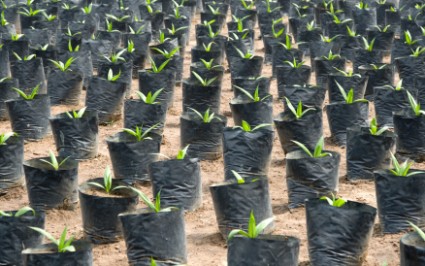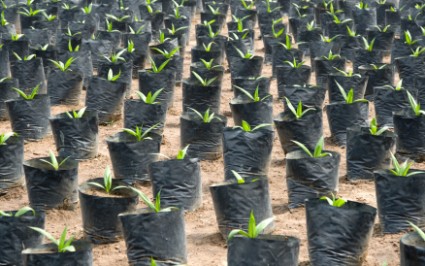 Palm-oil trees in the making, Ivory Coast.In his Late Victorian Holocausts, Mike Davis teases out the mechanisms of famine in British-ruled 19th century India.
Palm-oil trees in the making, Ivory Coast.In his Late Victorian Holocausts, Mike Davis teases out the mechanisms of famine in British-ruled 19th century India.
When a drought would wipe out a grain harvest in one region of India, the price of grain would spike. People all over the subcontinent would suddenly find themselves priced out of grain markets–even in places where grain harvests went well. Grain would then flow out of India to the “mother country,” where people could afford it, and literally millions of Indians would starve. That’s one way relatively minor natural disasters become vast human catastrophes.
Devastatingly, Davis details how the British Empire (wittingly or not) used these eminently avoidable famines to consolidate its grip over the Indian Raj.
I got to thinking of Davis’ dark masterpiece while reading Andrew Rice’s excellent, nuanced report, “Is There Such a Thing as Agro-Imperialism?,” in last Sunday’s New York Times Magazine.
Rice follows the gusher of money flowing from cash-rich, arable-land-poor countries like Saudi Arabia to buy up or lease farmland in Africa.
One thing that strikes me is the disconnect in what we hear about the quality of African farmland from rich investors, and what we hear about it from rich philanthropists.
Gates Foundation rhetoric makes Africa sound like a basket case, land-wise: references to “depleted” or “degraded” soils.
We hear relatively little about the continent’s vast agricultural assets–which wealthy investors are now busily snapping up. Andrew Rice visits Africa’s “billion-acre Guinea Savannah zone,” which he describes as “a crescent-shaped swath that runs east across Africa all the way to Ethiopia, and southward to Congo and Angola. “The World Bank and the FAO have declared the tract “one of the earth’s last large reserves of underused land,” Rice reports.
It evidently won’t be for long. A stampede of investors, ranging from governments like Saudi Arabia’s to U.S. hedge funds, are moving in. And many of the region’s pro-Westen, “modernizing” governments are inviting them. Ethiopia, for example, is planning to lease out 3.5 million acres of prime farmland to foreign interests for 50 cents an acre, Rice reports.
Rice interviews an executive of a Saudi agribusiness firm operating there.
“For a grower, this is heaven on earth,” says Jan Prins, managing director of the subsidiary company that is running the venture for Al Amoudi. Originally from the Netherlands, Prins says he assumed that Ethiopia was arid but was surprised to learn when he came to the country that much of it was fertile, with diverse microclimates. The Awassa farm is one of four that Prins is getting up and running. Using computerized irrigation systems, the farms will grow tomatoes, peppers, broccoli, melons and other fresh produce, the vast majority of it to be shipped to Saudi Arabia and Dubai.
My first reaction is: At those prices, maybe well-heeled Western foundations should start investing in farmland as part of a land-reform scheme. One of the many problems faced by Africa’s beleaguered smallholder farmers is land tenure.
But first we’d have to convince the Western anti-poverty/development establishment that smallholder farmers count. As Rice points out, the influential British economist Paul Collier has questioned whether small-scale farmers are part of the solution to the hunger crisis at all:
Last fall, Paul Collier of Oxford University, an influential voice on issues of world poverty, published a provocative article in Foreign Affairs in which he argued that a “middle- and upper-class love affair with peasant agriculture” has clouded the African development debate with “romanticism.” Approvingly citing the example of Brazil – where masses of indigenous landholders were displaced in favor of large-scale farms – Collier concluded that “to ignore commercial agriculture as a force for rural development and enhanced food supply is surely ideological.”
Brazil was indeed a provocative example for Collier to cite. That country has aggressively ramped up ag production, opening its vast (and incredibly biodiverse) savanna to monocrop soy production. U.S. agribusiness interests operate highly profitable subsidiaries there; U.S. farmers own and run huge soy farms there. Brazil is now one of the globe’s industrial-ag superpowers, a top-two exporter of soy, beef, sugar, coffee, and more.
Yet even with its supercharged agricultural sector humming, millions of Brazilians live in conditions of extreme poverty and food insecurity.As the FAO puts it:
Despite its relative prosperity (US$3500 GDP per head), 44 million Brazilians, a quarter of the population, lives in extreme poverty on a daily income which is less than US$1.06 a day.
If I’m reading Rice correctly, the play is to turn Africa into a kind of new Brazil: an export-minded agriculture superpower, smallholder farmers be damned. The high-minded case for the African land grab goes like this: Sure, huge swaths of land will be put to use to supply foreign markets; and food crops will leave a continent struggling mightily with hunger; but there will be a trickle down effect. And surely, in the event of a real hunger crisis, enough food would be kept within Africa to feed everyone.
Robert Zeigler, a U.S. botanist who heads the International Rice Research Institute, a classic Green Revolution group, made this precise case in the New York Times Magazine piece.
The idea that one country would go to another country … and lease some land, and expect that the rice produced there would be made available to them if there’s a food crisis in that host country, is ludicrous.
When I read that, I thought of the 44 million impoverished Brazilians, scraping by while huge amounts of food leave their country; and of those late-Victorian holocausts, when millions of Indians starved while grain flowed to Mother England.
And then, thankfully, I remembered that Milwaukee-based Growing Power will soon be operating in Africa, working with smallholder farmers and urban dwellers to build self-suffiency through low-input farming. A happy thought ahead of Thanksgiving.



